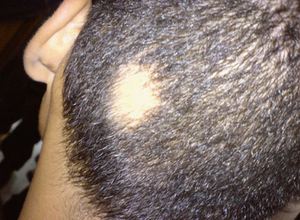JAK1 Inhibitors Found to Resolve Inflammation, Restore Hair Growth for Alopecia Areata
In recent research into alopecia areata treatments, selective JAK1 inhibition was tested as a means for restoring hair growth.

The selective inhibition of JAK1 was found to quickly resolve inflammation and promote the complete restoration of hair growth in the C3H/HeJ mouse model of alopecia areata (AA), according to recent findings.1
AA is an autoimmune disorder that is known for its unpredictability and its relationship with patients' increased risk of developing other conditions such as atopic dermatitis, thyroid dysfunction, psoriasis, vitiligo, thyroid dysfunction, diabetes mellitus, rheumatoid arthritis.
The study’s investigators pointed out that being able to understand and treat this autoimmune disorder could help clinicians address this and other related conditions.
The research was authored by Annika Åstrand, PhD, from BioPharmaceuticals R&D at AstraZeneca in Gothenburg, Sweden.
“The objective was to investigate the efficacy of selective JAK1 inhibition in the C3H/HeJ mouse model of AA as both ruxolitinib and tofacitinib had demonstrated complete resolution of inflammation and restoration of hair growth in both mice and humans with AA,” Åstrand and colleagues wrote.
Background and Findings
The investigators noted that a few recent research milestones regarding the mechanisms behind AA’s manifestation were reached, adding that these milestones have led to new treatments for patients.
The team used the C3H/HeJ mouse model of AA to determine the therapeutic efficacy of several JAK inhibitor regimens, with both local and systemic drug exposure being used.
In order to translate JAK1 inhibition’s efficacy for clinical treatment of AA, the research team compared the inhibitors to the action of ruxolitinib and tofacitinib in both cytotoxic CD8+ cells and human peripheral blood mononuclear cells (PBMCs).
The research team concluded that the selective JAK1 inhibition in the C3H/HeJ mouse model of AA showed promising results for the autoimmune condition.
“We demonstrate that selective inhibition of JAK1 produces fast resolution of inflammation and complete restoration of hair growth in the C3H/HeJ mouse model of AA,” the investigators wrote. “Furthermore, we show that topical treatment does not restore hair growth and that treatment needs to be extended well beyond that of restored hair growth in order to reach treatment-free remission.”
The investigators’ research also indicated that cytokines with involvement in the pathogenesis of AA are also inhibited in a similar way by selective JAK1 and pan-JAK inhibition in stimulated human peripheral lymphocytes. More specifically, they are stimulated in CD8+ T cells.
“In conclusion, our data reveal that selective JAK1 inhibitors are likely to be as efficacious as pan-JAK inhibitors in the treatment of AA, while reducing the risk of adverse events,” they wrote. “Furthermore, we have demonstrated that prolonged systemic exposure is likely to be required for sustained efficacy and that local JAK inhibition is not sufficient to restore hair growth, unless it also results in systemic inhibition.”
References:
- Mattsson, J, Israelsson, E, Björhall, K, Yrlid, LF, Thörn, K, Thorén, A, et al. Selective Janus kinase 1 inhibition resolves inflammation and restores hair growth offering a viable treatment option for alopecia areata. Skin Health Dis. 2023;e209. https://doi.org/10.1002/ski2.209